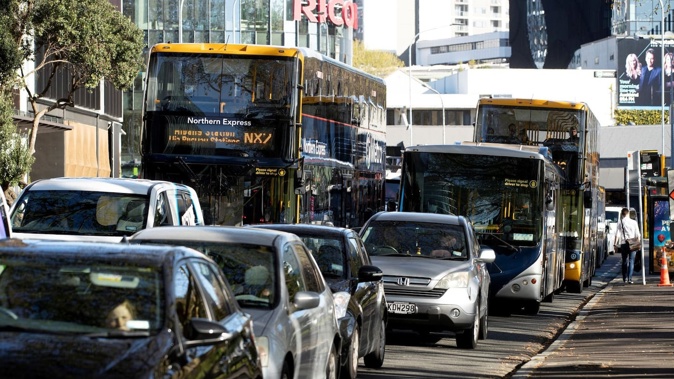
- Auckland Council and Auckland Transport set out a plan to slash transport emissions by 64% by 2030.
- Among the targets were halving car use, a 13-fold increase in cycling and a third of cars being electric.
- Councillor Daniel Newman says the plan is unfunded, delusional and it’s time for a rethink.
A “delusional” climate target to slash Auckland’s transport emissions that involves people halving their car use needs a rethink, says an Auckland councillor.
Councillor Daniel Newman said Auckland Council’s Transport Emissions Reduction Pathway (TERP) sets out a series of unfunded policy mandates to reduce Auckland’s transport emissions by 64% by 2030.
Among the targets are halving cars’ share of distance travelled from 94% to 47%, increasing public transport trips from 100 million a year pre-Covid to 550m, “supercharging” the use of bikes, e-bikes and e-scooters from less than 1% of the transport mode share to 13%; and the city’s car fleet being 32% electric by 2030.
“This arrangement is delusional and needs to be called out by Auckland Transport and Auckland Council. Reducing Auckland’s transport emissions by 64% by 2030 is a fantasy,” said Newman.
He said many targets are knowingly unfunded and assumed support from the previous Government when TERP was approved in 2022.
“The Government has changed with plans to invest in new highways, local roads and road resealing,” said Newman, who is a National Party member.
 Auckland councillor Daniel Newman. Photo / Michael Craig
Auckland councillor Daniel Newman. Photo / Michael Craig
Last month, Air New Zealand abandoned a 2030 goal to cut its carbon emissions because it would struggle to meet it, blaming difficulties securing more efficient planes and sustainable jet fuel.
The airline was the first major carrier to back away from such a climate target.
Researchers at the University of Otago have rated 21 big companies on their climate targets, with Air New Zealand and Mitre 10 among the worst and Fonterra among the best.
When TERP was approved, then-Mayor Phil Goff, AT and council officers were adamant there was time before 2030 to pull it off, saying Auckland could not rely on incremental change.
Goff said the plan was transformational, ambitious and tough “because it has to be”.
Transport is the largest source of Auckland’s carbon emissions, accounting for more than 40% with the bulk of these emissions coming from road transport.
Auckland Council acting director of policy planning and governance, Miriana Knox, said TERP remains council policy and a strategic document to guide transport planning.
She said it sets out at a high level what is needed for Auckland to achieve emissions reduction of the scale necessary to achieve its climate goals in the council climate plan, Te Tāruke-ā-Tāwhiri.
 Auckland Transport has reduced its target for cycling counts when TERP calls for a 13-fold increase in cycling. Photo / Michael Craig
Auckland Transport has reduced its target for cycling counts when TERP calls for a 13-fold increase in cycling. Photo / Michael Craig
Knox, who was also speaking on behalf of AT, acknowledged the need for more funding from central and local government, and the need to move funding towards emission reduction.
The momentum for meeting the TERP targets has waned since 2022, especially since the new Government took office and significantly increased investment in roads and cut funding for cycling and footpaths.
For example, over the past two years, AT has reduced the target for cycling counts at selected sites from 3.85 million trips in the 2023 financial year to 3.12m in 2024, and its statement of intent over the next three years forecasts a moderate increase to 3.61m trips by 2027.
Auckland councillor Richard Hills said TERP aligns with the Paris Agreement.
Councillor Richard Hills, who chaired the environment and climate change committee when TERP was adopted, said the plan aligned with the Paris Agreement signed by the previous Government and endorsed by the current Government.
“The Paris Agreement targets are bold and will be hard for the Government to meet, just like the TERP targets are for Auckland.
“The longer we delay, the harder it will be for the next generation, but I am glad we are still moving forward with record investment in public transport, such as new trains for the City Rail Link, the Eastern Busway is under way and our climate targeted rate (which) is speeding up investment in things like more frequent bus services across the city and electrifying our bus and ferry fleets,” Hills said.
He said more investment and leadership will be needed over time, but the council is moving in the right direction.
Said Newman: “It is high time that we restate the cost of the unfunded mandate that is TERP and publicly debate whether Aucklanders should foot the bill, or discard the document.”
The Herald is seeking comment from Mayor Wayne Brown.
Take your Radio, Podcasts and Music with you









